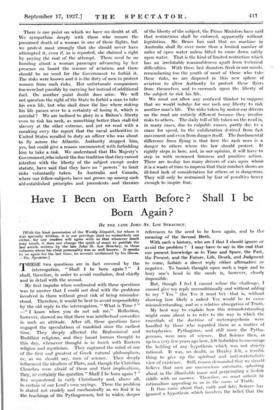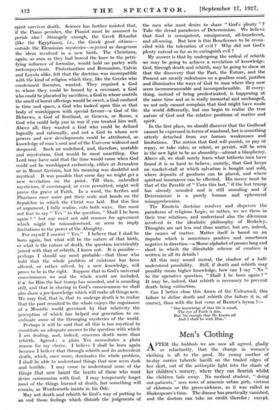Have I Been on Earth Before ? Shall I be
Born Again ?
BY THE LATE JOILN ST. LOE STRACHEY.
• [With the kind permission of the Weekly Dierpakh, for whom it was specially written it is our privilege (and no melancholy one either, for our readers will agree with us that whatever death may touch, it does not change the spirit of man) to publish the last article written by the late John St. Loe Strachey, in these columns where his vivid personality was so well known. It speaks to 1313 again for the last time, its accents undimmed by his illness. —ED. Spectator.] THESE two questions are in fact covered by the interrogation, "Shall I be born again ? " I shall, therefore, in order to avoid confusion, deal chiefly and in detail with the second.
' My first impulse when confronted with these questions was to answer that I could not deal with the problems • involved in them without great risk of being misunder- stood. Therefore, it would be best to avoid responsibility by- the old reply to the interrogation, "What is-Time ? " —" I know when you do not ask me." Reflection, 'however, showed me that there was intellectual cowardice in such an attitude. After all, these questions have engaged the speculations of mankind since the earliest time. They deeply affected the Brahminical and Buddhist religions, and they haunt human thought to this day, whenever thought is in touch with Postern religion and mysticism. They captured the mind of one of the first and greatest of Greek natural philosophers, Or, as we should say, Men of science. They deeply • influenced the idealism of Plato, arid, though the Christian Churches were afraid of them and their implications, they, or certainly the question "Shall I be born again ? " Jive sequestered in 'early Christianity and, above all, in certain of our Lord's own sayings. There the problein Is stated not crudely and mechanically as we find it in the teachings of the Pythagoreans, but in Wider, deeper references to the need to be born again, and to the meaning of the Second Birth.
With such a history, who am I that I should ignore or avoid the problem ? I may have to say in the end that our present knowledge as to Time and Space, the Past, the Present, and the Future, Life, Death, and Judgment to Come, forbids a direct reply either affirmative or negative. To banish thought upon such a topic and to bury one's head in the sands is, however, clearly impossible.
But, though I feel I cannot refuse the challenge, I cannot give my reply unconditionally and without adding to my " Yes " (for Yes it must be)—that is, without showing how likely a naked Yes would be to cause misunderstanding, and so a relative abnegation of Truth.
My best way to explain how this misunderstanding Might come about is to refer to the way in which the essentials of the doctrine of metempsychosis were handled by those who regarded them as a matter of metaphysics. Pythagoras, and still more the Pytha- goreans, were men of science. But Science then, as up to a 'very few years ago here, felt forbidden to encourage the holding of any hypothesis which was not strictly rational. It was, no doubt, as Huxley felt, a terrible thing to give up the spiritual and anti-materialistic view of existence. Still, reason demanded that we should believe that men are unconscious automata, splashing about in the illimitable inane and perpetrating a foolish riddle with no answer. Therefore, we must submit to rationalism appealing to us in the name of Truth. It thus came about that, early and late, Science has ignored a hypothesis which involves the belief that the spirit survives death. Science has further insisted that, if the Piano perishes, the Pianist must be assumed to perish also ! Strangely enough, the Greek Ritualist (like the Egyptians), i.e., the Greek good citizen— outside the Eleusinian mysteries—rejected as dangerous the ideas involved in a new birth. The Christians, again, as soon as they had bowed the knee to the petri- fying influence of formulae, would hold no parley with metempsychosis. Protestantism and Romanism, Calvin and Loyola alike, felt that the doctrine was incompatible with the kind of religion which they, like the Greeks who condemned Socrates, wanted. They required a God to whom they could be bound by a covenant, a God who could be placated by sacrifices, a God in whose nostrils the smell of burnt offerings would be sweet, a God confined in time and space, a God who looked upon this or that body of worshippers with special favour—a God of the Hebrews, a God of Scotland, or Geneva, or Rome, a God who could help you in war if you treated him well. Above all, they wanted a God who could be defined logically and rationally, and not a God to whom new powers and new developments could be attributed, as knowledge of man's soul and of the Universe widened and deepened. Such an undefined, and, therefore, unstable and mysterious, God would be most unsettling. Our Lord may have said that the time would come when God could not be worshipped exclusively, either at Jerusalem or in Mount Gerizim, but his meaning was doubtful and mystical. It was possible that some day we might get a new revelation on the point. Till then, unbridled mysticism, if encouraged, or even permitted, might well prove the grave of Faith. In a word, the Scribes and Pharisees once more put their seals and bonds on the Sepulchre in which the Christ was laid. But this line of argument, I fully realize, cuts both ways. One must not fear to say " Yes " to the question, "Shall I be born again ? " but one must not add reasons for agreement which might be misunderstood, or seem to imply limitations to the power of the Almighty.
For myself I answer "Yes." I believe that I shall be born again, but what, will be the nature of that birth, or what is the nature.bf death, the question inextricably joined with that of rebirth, I know not. It is possible— perhaps I should say most probable--that those who hold that the whole problem of existence has been altered, or rather solved, by a new knowledge, will prove to be in the right. Suppose that in God's universal consciousness we and the whole world are included, tl at for Him the last trump has sounded, and is sounding still, and that in sharing in God's consciousness we shall also share a pre-knowledge which will make all things new. We may find, that is, that to undergo death is to realize that the part reunited to the whole enjoys the cognizance of a Monistic world governed by that relativity the perception of which has helped our generation to co- ordinate some of the thronging mysteries of the world.
Perhaps it will be said that all this is too mystical to constitute an adequate answer to the question with which I am dealing, and, indeed, concerns death more than rebirth. Agreed ; a plain Yes necessitates a plain reason for my choice. I believe I shall be born again because I believe that through rebirth and its antecedent death, which, once more, dominates the whole problem, I shall be able to understand things that now seem dark and terrible. I may come to understand some of the things that now haunt the hearts of those who most desire communion with God. I may temporarily forget most of the things learned at death, but something will remain, as Wordsworth insists in his Ode.
May not death and rebirth be God's way of putting to an end those feelings which disturb the judgments of the men who most desire to share "God's plenty " ? Take the dread paradoxes of Determinism. We believe that God is omnipotent, omnipresent, all-beneficent, and all-seeing. But how is this Beneficence to be recon- ciled with the toleration of evil ? Why did not God's plenty extend so far as to extinguish evil ?
My answer is that by undergoing the ordeal of rebirth we may be going to achieve. a revelation of knowledge. God, through death and rebirth, may be going to show us that the discovery that the Past, the Future, and the Present are merely milestones on a goalless road, justifies and illuminates the ways of God to man where they now seem incommeasurable and incomprehensible. If every- thing, instead of being predestinated, is happening at the same time and so is really immortal and unchanged, we not only cannot complain that God might have made the world differently, but can begin to realize the true nature of God and the relative positions of matter and spirit.
In the first place, we should discover that the Godhead cannot be expressed in terms of manhood, but is something utterly detached from our human weaknesses and limitations. The notion that God will punish, or pay or repay, or take sides, or relent, or persist, will be seen in the new light to be an absurdity—almost a blasphemy. Above all, we shall surely learn what hitherto men have found it is so hard to believe, namely, that God keeps no market-stall at which salvation is bought and sold, where deposits of goodness can be placed, and where spiritual insurances can be effected. His mercy must be that of the Parable of " Unto this last," if the last trump has already sounded and is still sounding and if. Determinism is a purely human and ephemeral misapprehension.
The Einstein doctrine resolves and disperses the paradoxes of religious Logic, or rather, we see them in their true relations, and understand also the dilemmas involved in the idealistic philosophy of Berkeley. Thoughts are not less real than matter, but are, indeed, the causes of matter. Matter itself is based on an impulse which is sometimes positive and sometimes negative in direction—a Morse alphabet of pauses long and short in which the illimitable scheme of creation is written in all its details !
All this may sound unreal, the shadow of a half. understood possibility. Still, if death and rebirth may possibly mean higher knowledge, how can I say " No " to the operative question, "Shall I be born again ? " It may be, indeed, that rebirth is necessary to prevent death being extinction.
Can I better close this Amen of the Unlearned, this failure to define death and rebirth (for failure it is, of course), than with the last verse of Baxter's hymn ?— " Our knowledge of that life is small, The eye of Faith is dim.
But 'tis enough that He knows all And I shall be with Him."















































 Previous page
Previous page